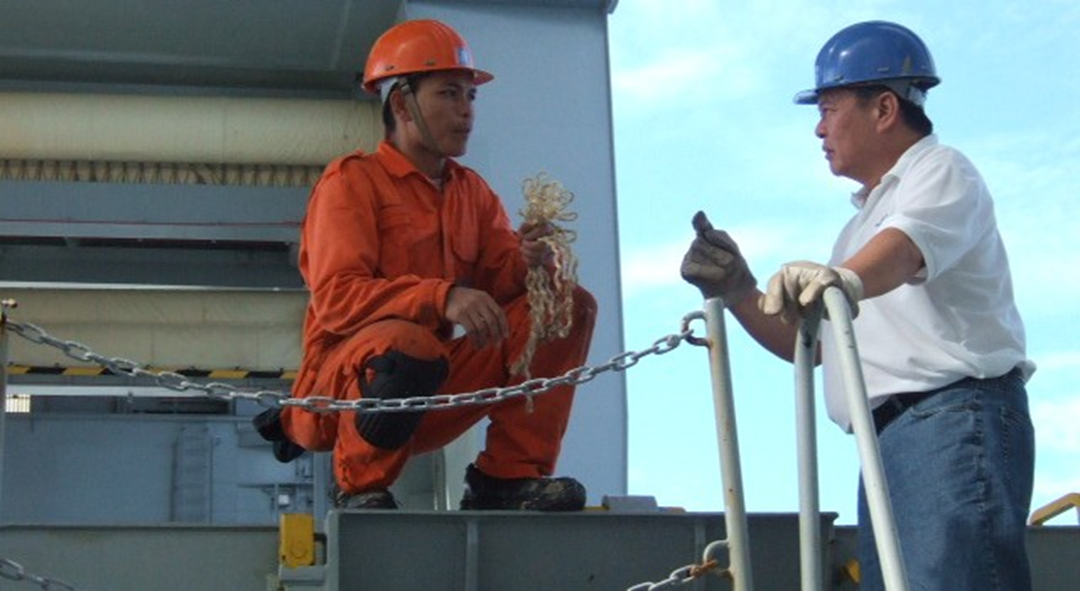By Åse Dragland
Shipping is an industry which demands continuous training and re-certification of its captains, second and third officers and engineers. Officers should be skilled at navigating their vessels and must assume key roles.
However, for many years now our experience of training at sea has been dismal. Norwegian merchant fleet officers are struggling to put what they learn on courses into practice, and in some areas are working counter to what they have learned about procedures.
We have yet to find an effective way of making the link between formal theory and practice on board ship, but SINTEF researchers now have an idea which has inspired the Bergen shipping companies Grieg Star and Kristian Gerhard Jebsens Skipsrederi (KGJS).
Instead of sending officers back to school, researchers want them to learn on board their vessels using game technology.
Carrying on as before
Researchers Hans Torvatn and Gunnar Lamvik at SINTEF Technology and Society have been working with Grieg Star for some time now. Three years ago they carried out surveys which revealed in the clearest possible terms that the 112 officers employed by the company agreed it was good practice to adhere to routines and procedures. However, they also responded that their working practices ran counter to guidelines.
"We're talking about people who stick to their old ways, and simply imitate their colleagues", says Torvatn. "For example, if the engines need more lubrication oil, instructions are not adhered to. They just follow the principle ‘the more the merrier’. As a result engines get damaged, the excess oil causes pollution and costs increase", he says.
"We also observe that officers fail to plan shipping voyages adequately and effectively. Efficient fuel consumption requires following the right procedures depending on whether you are steaming ahead of, or behind, another vessel", adds Torvatn. "And if you also let your engines idle in port, even more fuel is used up", he says.
EU wants Philippine training out
Current debate within in the EU is also giving the shipping sector some cause for concern. There are signs that the EU intends to stop recognising Philippine basic maritime training programmes to the extent that vessels employing officers with such training will not be permitted to put in at European ports, even though the ships themselves are from European states.
"The shipping companies may have to replace their crews or find alternative solutions", says Gunnar Lamvik. With more than 20,000 Philippine personnel currently employed on Norwegian vessels, it is no surprise this a problem for Norwegian shipping companies", he says.
Shipping companies want change
"It has been known for some time that the shipping sector has been operating less than optimally", says Hans Torvatn. "The industry is becoming increasingly more complex. Demands for training are increasing, so the operators must have effective crew training programmes in place", he says.
Researchers are basing their work on the issue as expressed by the shipping companies themselves – "energy consumption during shipping operations". For a shipping company operating some tens of vessels, it is of vital environmental and financial importance to find solutions.
Another factor to take into consideration is that the employees on board vessels are starting to go online. In a few years, online connections and internet use on vessels will become more common, and there will be a new generation of personnel who are used to games and computer interaction.
Learning by experience
"Our learning concept is untraditional in a maritime context", says Lamvik. "As a supplement to the current training centres and cadet programmes for those aiming to be officers, we want to create an on board learning culture based on experimentation.
We know that learning occurs jointly in groups by means of reflection", he says. "This is why we aim to develop a teaching module or interactive game which will force personnel to reflect on results and talk to each other. In terms of content, the programme will focus on energy efficiency and voyage planning, and will be linked to existing on board systems" adds Torvatn. "Philippine crews are known for being ‘community-oriented’, and our aim is to get them to try things out together using simulations, and to seek mutual input when they are uncertain", he says.
SINTEF is currently working with the Norwegian company Seagull, which supplies computer-based training systems – already installed on 8,000 vessels.
About the TOOLS project:
*Project participants are Grieg Star AS, Kristian Gerhard Jebsen Skipsrederi AS, SINTEF Technology and Society, Seagull, SMS Global, High Skillz, and NTC-M (an educational centre in the Philippines).
*The project is being funded by the Research Council of Norway's MAROFF innovation programme.
*The project will run from 2013 to 2016.
*The first tests will be carried out in 2014.


